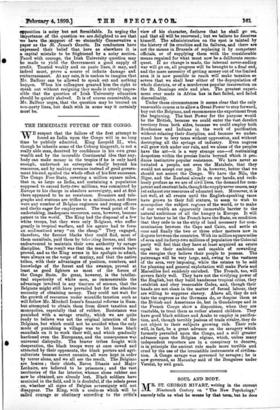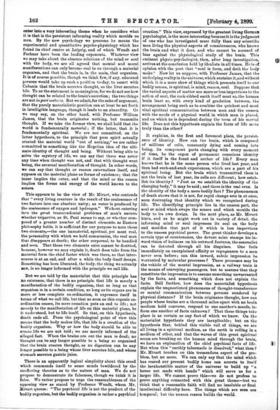SOUL AND BODY. AT , R. ST. GEORGE MI VART, writing
in the current IX Nineteenth Century on " The New Psychology," scarcely tells us what he means by that term, but he does enter into a very interesting theme when he considers what it is that is the persistent informing reality which moulds us men. By the new psychology we presume be means the experimental and quantitative psycho-physiology which has found its chief centre at Leipzig, and of which Wundt and Fechner have been the leading exponents. Whatever view we may take about the obscure relations of the mind or soul with the body, we are all agreed that mental and moral manifestations can only become real to us through a material organism, and that the brain is, in the main, that organism. It is of course possible, though we think few, if any, educated persons would take up such a position to-day, to assert with Cabanis that the brain secretes thought, as the liver secretes bile. To us the statement is meaningless, for we do not see how thought can be related to the brain's secretion; the two things are not impart materia. But we ad mit, for the sake of argument, that the purely materialistic position can at least be set forth in intelligible language, though it leads to an absurdity. Or we may say, on the other hand, with Professor William James, that the brain originates nothing, but transmits thought. If we take the former view, we shall hold that the world is fundamentally material ; if the latter, that it is fundamentally spiritual. We are not committed, on the latter hypothesis, to the principle that pure spirit actually created the material world "out of nothing," we are rather committed to something like the Hegelian idea of the ulti- mate identity of thought and being. Without being able to solve the mystery of life, we can say that there was never any time when thought was not, and that with thought went being, the external manifestation of thought. In other words, we can say that thought or reason externalises itself, and appears on the material plane as forms of existence; that the inner implies the outer, and that the mind or the reason implies the forms and energy of the world known to the senses.
This appears to be the view of Mr. Mivart, who contends that " every living creature is the result of the coalescence of two factors into one absolute unity; as water is produced by the coalescence of oxygen and hydrogen." Without entering into the great transcendental problems of man's nature, whether tripartite, as St. Paul seems to say, or whether com- posed of a greater number of distinct elements, as Eastern philosophy holds, it is sufficient for our purpose to note these two elements,—the one immaterial, spiritual, yet most real, the personality with which we hold communion, the real man that disappears at death ; the other corporeal, to be handled and seen. That these two elements exist cannot be doubted, because, however we may explain it, death does take from the material form the chief factor which was there, so that inter- course is at an end, and after a while the body itself decays. Something has been liberated, the body, the thing we actually saw, is no longer informed with the principle we call life.
But we are told by the materialist that this principle has no existence, that there is no principle. that life is merely a manifestation of the bodily organism, that so long as that organism is in a certain condition, so long as its organs are in more or less complete co-ordination, it expresses itself in terms of what we call life, but that so soon as this organic co- ordination ceases, its mere cessation puts an end to life ; not merely to the manifestation of life on this material plane, be it understood, but to life itself. So that on this hypothesis, death ends all. From the psychological point of view this means that the body makes life, that life is a creation of the bodily organism. Why or how the body should be able to create life we are not told ; we are merely informed of the alleged fact. When the brains are out the man is dead; no thought can be any longer possible to a being so organised that the brain creates thought, as no digestion can be any longer possible to a being whose liver secretes bile, and whose stomach secretes gastric juice.
There is an apparently logical simplicity about this creed which commends itself to some minds bewildered by the conflicting theories as to the nature of man. We do not propose to demonstrate its falseness, though we think it is false. We rather propose to urge the reasonableness of the opposing view as stated by Professor Wundt, whom Mr. Mivart quotes : "The psychical life is not the product of the bodily organism, but the bodily organism is rather a psychical
creation." This view, expressed by the greatest living German psychologist, is the more interesting because it is the judgment of one who has investigated more fully than any scientitlo man living the physical aspects of consciousness, who knows the brain and what it does, and who cannot be accused of bias against the physiological study of the brain. This eminent physio-psychologist, then, after long investigation, arrives at the conclusion held by idealists in all times. He is of opinion with the poet that "soul is form, and doth the body make." Now let us suppose, with Professor James, that the underlying reality in the universe, which sustains it, and without which it is a mere show of things which presents itself to our bodily senses, is spiritual, is mind, reason, soul. Suppose that the varied aspects of matter are more or less impervious to the action of soul, the rock-ribbed earth itself most so, the human brain least so, with every kind of gradation between, the arrangement being such as to combine the quickest and most vital spiritual communication between man and the unseen with the needs of a physical world in which man is placed, and on which he is dependent during the term of his mortal life. Does not this hypothesis explain the facts of life more truly than the other?
It explains, in the first and foremost place, the persist. ence of identity. How can the brain, which is composed of millions of cells, constantly dying and coming into being, its component parts changing with every moment of time, be the organ of permanent conscious identity if it itself is the fount and author of life ? Every mau knows that he is the same person who lived last year, and then had such-and-such experiences, which are a part of his spiritual being. Bnt the brain which transmitted them is not the brain of last year, its cells are different ; how estab- lish its identity ? " Just as we establish the identity of the changing body," it may be said ; and there is the real crux. Is the identity of the body a mere bodily fact ? The phenomenon of death shows that it is not, for rapid change sets in at once, soon destroying that identity which we recognised during life. The identifying principle lies in the unseen part, the soul or mind which sways the senses and which moulds the body to its own design. In the next place, as Mr. Mivart hints, and as he might work out in variety of detail, the informing mind or soul impresses its seal on the body and modifies that part of it which is less impervious to the unseen psychical power. The great thinker develops a certain type of countenance, the devout saint stamps his in- ward vision of holiness on his outward features, the sensualist can be detected through all his disguises. One feels immediately an unexplained affinity or repugnance to a man never seen before ; can this inward, subtle impression be warranted by molecular processes ? These processes may be the vehicle of the mental impression, as a railway train is the means of conveying passengers, but to assume that they constitute the impression is to assume something unwarranted by the facts, and something which does not explain the facts. Still further, how does the materialist hypothesis explain the unquestioned phenomena of thought-transference or mental communication between persons sundered by physical distance ? If the brain originates thought, how can people whose brains are a thousand miles apart with no brain medium hold converse, respond to one another's moods, in- form one another of facts unknown? That these things take place is as certain as any fact of which we know. On the materialist hypothesis they are inexplicable; but on the hypothesis that, behind this visible veil of things, we are all living in a spiritual medium, as the earth is rolling in a medium of ether, and that the waves of this great spiritual ocean are breaking on the human mind through the brain, we have an explanation of the chief psychical facts of life. But when this "earthly tabernacle is dissolved," what then ? Mr. Mivart touches on this tremendous aspect of the pro- blem, but no more. We can only say that the mind which has reared our present bodily home can accrete to itself the inexhaustible matter of the universe to build up " a house not made with hands" which will serve us for a larger life. We cannot prove this—we do not profess to prove anything connected with this great theme—but we think that a reasonable faith will find no insoluble or final intellectual difficulty here. The things which are seen are temporal; but the unseen reason builds the world.



































 Previous page
Previous page